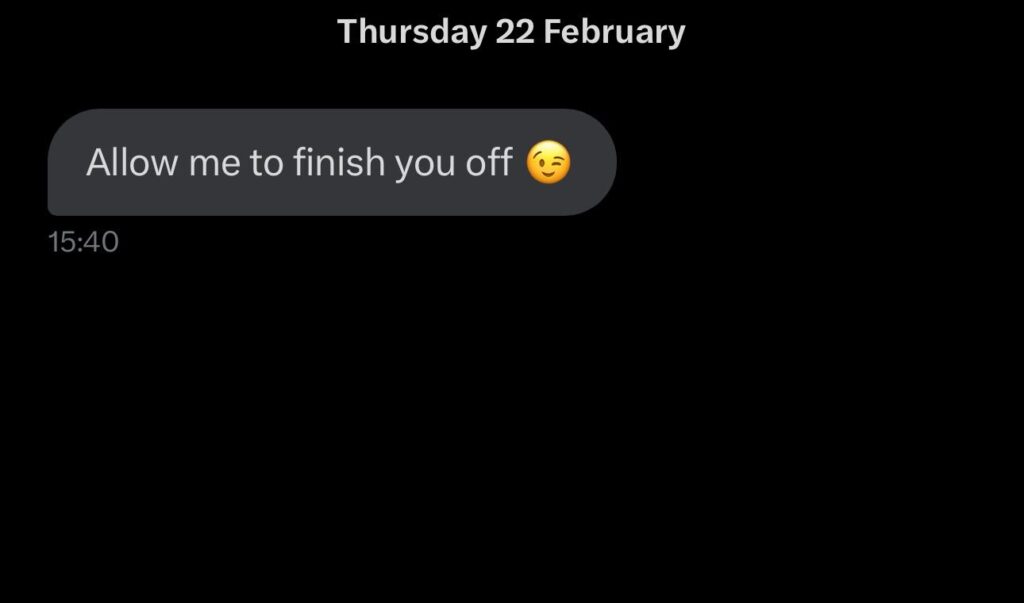Sexist abuse, receiving unsolicited sexual photos and messages have become commonplace for women working in football.
Last season, reports of sexism and misogyny to Kick It Out increased by 400% compared to the previous campaign.
Abigail Rudkin, 23, an artist and Liverpool fan who works closely with fan media and recently appeared on Gary Neville’s The Overlap podcast, has suffered sexist abuse on a regular basis since she began posting on Twitter (X) four years ago. She is also regularly bombarded by sexual messages, photos, and videos, primarily from men.
“It’s always naked pictures of random men or naked pictures of them in the mirror.
“If I don’t reply, they ask: ‘Why did you ignore me?’ Sometimes they comment on my artwork with ‘check your DMs’ and I feel like putting back: ‘What, so I can respond to a picture of your k**b?'”
The 23-year-old also regularly receives requests from men wishing to pay for her worn socks or underwear, or to become a financially dominated “paypig.” A paypig is someone who provides another person with money for sexual gratification.

“People will send you videos of them masturbating and then : ‘This was me looking at pictures of you’,” said Abigail. “It makes you feel so disgusted. It just makes your skin crawl.”

Twitter messages received by Abigail (Source: Abigail Rudkin)
Elicia Jane, therapist and editor of The Knowledge of Freedom, has examined the psychology behind this trend, highlighting the male sex drive is responsive, meaning that sending or receiving naked pictures is arousing.
“However, the same does not work in return for women, because the female sex drive does not respond to the male, it is its own thing,” said Ms Jane.
“This is the problem that should not be a problem but now is, because we have created a world where men and women have become so disconnected from who each other are that far too many people have no idea that these differences exist in the way they do.
“We have sold sex positivity to men as a sign that women love sex and want sex just as much as them. So, the psychological reason why men send women d*ck pics is likely that they truly believe women think and work like men. Until we change that mistaken belief, the d*ck pics will likely keep flooding women’s inboxes.”
Despite a number of positive strides being made, such as Rebecca Welch becoming the first ever female Premier League referee, and Women’s Super League attendances increasing by 43% this season, misogyny towards women in football on social media continues to rise.
“I remember someone posted on one of the paintings I did of Klopp, saying ‘If a lad had done this, no one would have bought it. You are all only buying it because she is a girl’.
“I remember feeling really crap about it at the time. I was 19 and it felt like the end of the world.”
As a Liverpool season ticket-holder, Abigail often posts football opinions on Twitter, and was asked about her team’s chances of winning the title on The Overlap.
However, since Joey Barton began posting negatively about women involved in football on social media, she has noticed a spike in the negative backlash to her football-related posts.
The controversial ex-footballer has repeatedly made headlines for his negative social media posts about female players, pundits and commentators, which led to ITV pundit Eni Aluko fleeing the UK over fears for her safety.
“There has been a massive increase in abuse since Joey Barton’s comments. I did The Overlap, and people tagged Joey Barton in comments I had made to try and get him to respond or say something about what I had said.
“It’s not just people tagging him, it is also a massive rise in people thinking your opinion is irrelevant.”
During the 2023 Women’s World Cup, FIFA revealed that one in five players suffered online abuse, with female players 29% more likely to encounter online abuse compared to male players during the 2022 Men’s World Cup.
Kathryn Batte, a football reporter at the Daily Mail, has noticed the rise of controversial figures such as Joey Barton has led to sexist abuse becoming more normalised across social media.
“I think when high profile people are coming out with certain opinions it almost gives credence to people that hold them that either haven’t been saying them or had just been ignored before.
“When the Kevin Keegan thing happened, that was different as it was more of an uneducated comment, he wasn’t doing it to be deliberately abusive to women working in football, he just made a comment that could be perceived as sexist.
“That then gave credence to lots of people saying ‘yeah, women are rubbish at talking about football,’ and it almost gives validation to people who wanted to take it further than what Keegan said.”
Kathryn, who has been working as a football reporter for nearly five years, covers West Ham’s men’s team as well as the WSL and the Lionesses, and is encouraged to post opinions and comments on social media as part of her job, but this can often lead to sexist abuse.
She said: “You are doing that knowing not everyone is going to agree with you. But there’s a difference between people disagreeing and having a debate and just being abusive.
“You have to try and have thick skin, but sometimes you can’t have it everyday, and the littlest comments get to you.
“Sometimes it makes you think ‘God, have I got the energy to actually post something?”
In sports journalism, there remains a gender disparity, with women only making up 14% of those registering for NCTJ-accredited sports journalism courses in 2022, a long way off the organisation’s target of 25%.
Kathryn said she hopes the abuse women in football, particularly those on TV, receive will not put younger women off wanting to go into sports journalism.
“I hope not, but I wouldn’t be surprised if it did. If you are looking at someone like Eni Aluko or Lucy Ward, whether you think they are good or not, the amount of abuse they are getting just for being a woman, before they you even decide whether they are good at their job or not.
“People know that if you make any hint of a mistake it is going to be picked up.”
Some female ex-players who are now pundits and commentators such as Alex Scott, who played 140 games for England, have studied journalism courses, something which male ex-players such as Gary Lineker, the highest-paid BBC presenter, have not done.
Kathryn said: “I think that shows how women have to go out there and get a qualification to prove they can do the job, because they know if they make a mistake it is probably going to be highlighted more than a man in the same position.”




